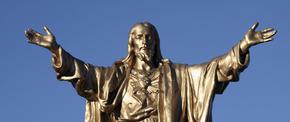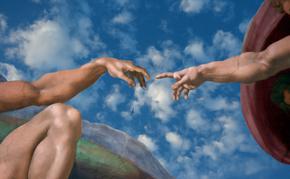The views expressed in our content reflect individual perspectives and do not represent the authoritative views of the Baha'i Faith.
When I was first a Baha’i, I used to go with my Baha’i friends to the local Christian coffee shop, in order to teach the Baha’i Faith. Of course, the purpose of the coffee shop was for Christians to try to “save” me from my heterodox and religiously wayward ways.
 In conversations, I would mischievously ask my Christian friends this question: “When Christ returns, what will His name not be?”
In conversations, I would mischievously ask my Christian friends this question: “When Christ returns, what will His name not be?”
Sensing a riddle, my Christian friends’ faces would draw quizzical blanks, question-mark furrows above their knitted eyebrows. Of course, they were curious as to my answer.
So, what’s the answer, you ask? I’ll give you my answer at the end of this short series of three articles. But first let me explain what the Baha’i perspective on the “return of Christ” is — and what it does not mean!
As I understand it, “return” means a recurrent pattern, which the Baha’i teachings describe as the reappearance of qualities, not of essences or identities:
We will begin to elucidate it from the Gospel, for there it is plainly said that when John, the son of Zacharias, appeared and gave to men the glad tidings of the Kingdom of God, they asked him, “Who art thou? Art thou the promised Messiah?” He replied, “I am not the Messiah.” [John 1:19–20, paraphrase.]
Then they asked him, “Art thou Elijah?” He said, “I am not.” [John 1:21, paraphrase.]
These words prove and show that John, the son of Zacharias, was not the promised Elias. But on the day of the transfiguration on Mount Tabor Christ said plainly that John, the son of Zacharias, was the promised Elias.
In chapter 9, verses 11–13, of the Gospel of Mark, it is said:
“And they asked Him, saying, Why say the scribes that Elias must first come? And He answered and told them, Elias verily cometh first, and restoreth all things; and how it is written of the Son of man, that He must suffer many things, and be set at nought. But I say unto you, That Elias is indeed come, and they have done unto him whatsoever they listed, as it is written of him.”
In chapter 17, verse 13, of Matthew, it is said: “Then the disciples understood that He spake unto them of John the Baptist.”
They asked John the Baptist, “Are you Elias?” He answered, “No, I am not,” although it is said in the Gospel that John was the promised Elias, and Christ also said so clearly. Then if John was Elias, why did he say, “I am not”? And if he was not Elias, why did Christ say that he was? – Abdu’l-Baha, Some Answered Questions, pp. 132–133.
You can see the potential for confusion here. When the Baha’i writings describe “return,” they say that a prophet’s inner qualities and spiritual realities return—not the actual body or identity of the former messenger of God.
In the second installment of this short series, let’s look at the three questions asked of John the Baptist—as they bear directly on this important theme of return.
You May Also Like
Comments

















Besides, a lot of these depictions show Him as a blonde white man when he was clearly of Middle Eastern origin.